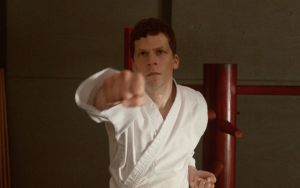THE ART OF SELF-DEFENSE: 2 ½ STARS. “jarring, absurdist message.”
 Remember the Charles Atlas 97-pound-weakling ads that used to run in the back of comic books? After a mild-mannered guy gets sand kicked in his face he transforms from “chump into a champ.” “The Art of Self-Defense,” a new dark comedy starring Jesse Eisenberg, blows this premise up to absurd proportions for the big screen.
Remember the Charles Atlas 97-pound-weakling ads that used to run in the back of comic books? After a mild-mannered guy gets sand kicked in his face he transforms from “chump into a champ.” “The Art of Self-Defense,” a new dark comedy starring Jesse Eisenberg, blows this premise up to absurd proportions for the big screen.
Eisenberg is accountant Casey Davies, a loner whose only friend is his dachshund. One night, on a dog food run to the store, Casey is randomly attacked by a group of motorcycle thugs. While he whimpers, they beat the living tar out of him, leaving him hospitalized for weeks. Upon recovery he considers buying a gun for self-defense but instead takes up karate at a local dojo run by a charismatic sensei (Alessandro Nivola). “This is your belt,” he says. “It is yours, and it’s sacred. There’ll be a fifteen-dollar charge to replace a lost belt.”
What Casey doesn’t know is that the dojo is not simply a place to learn to punch and kick, but a dark and dangerous gateway to trouble where students, like Henry (David Zellner) and Anna (Imogen Poots), are brainwashed and manipulated by a walking, talking exemplar of toxic masculinity. “From now on, you listen to metal. It’s the toughest music there is.”
“The Art of Self-Defense” is a satire that plays with the idea of manhood and what it means to be a “man.” In the twisted sensei’s opinion, the direct path to empowerment is through violence. Any dissenters are written off as “weak” and dealt with. It is that single-mindedness and decisiveness that draws Casey into the dojo’s macho world.
Writer-director Riley Stearns creates interesting characters. Sensei is a chauvinistic caricature, a cruel teacher who believes that, “guns are for the weak.” Casey is an outsider whose character arc swings from one extreme to the other. Nivola and Eisenberg are interesting foils for one another, although Stearns’s insistence on having his characters speak in an affected monotone wears thin, even if they are occasionally saying interesting things.
“The Art of Self-Defense” will be comparted to “Fight Club” for its look at the reasons why men behave the way they do. The two films share themes of loneliness, societal breakdown and emasculation but they take very different roads to self-actualization. Both share a broad sense of humour—“The Art of Defense’s” climax is as unfunny as it is unexpected—but where David Fincher’s film was a phantasmagoric fantasy, the newer film is mired in a drab, everyday realism that feels at odds with its jarring, absurdist message.
